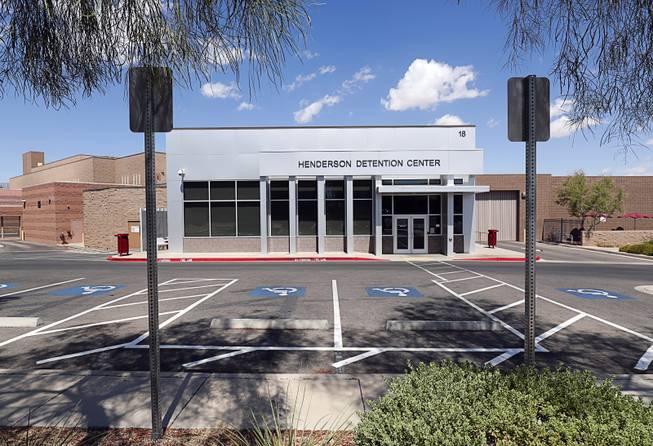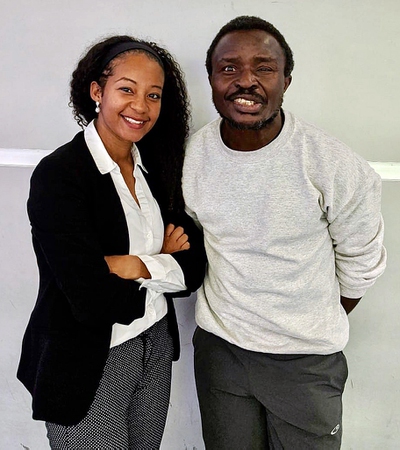Thursday, April 2, 2020 | 9:45 p.m.
An asylum seeker represented in a lawsuit, which argues the Henderson Detention Center could be a coronavirus death trap for those with underlying medical conditions, was released Thursday afternoon, two days after the motion was filed.
Christopher Njingu, 51, was placed on parole, and his asylum case will likely be transferred to Maryland, where he hopes to reunite with family members in the coming days, his attorney Enedina Dorsey-Kassamanian said.
The move by Immigration and Customs Enforcement — which contracts with the detention center to hold its inmates — came before it was due to respond to the temporary restraining order filed by the Nevada chapter of the American Civil Liberties Union in federal court, ACLU attorney Nikki Levy said.
The lawsuit named Njingu, 51, and Daniel Mosso Ramirez, 45. It claims that the plaintiffs’ preexisting medical conditions make it more likely that a spread of the novel virus at the jail could prove deadly for inmates like them. According to the complaint, an ICE staffer who transferred inmates from Utah to the Henderson jail later tested positive for COVID-19, which prompted the agency to isolate 13 inmates who had interacted with the staffer.
Njingu has hypertension, high cholesterol, and suffers chronic pain from torture he suffered during a civil war that broke out in his native Cameroon, according to the suit. He has no known criminal history.
It wasn’t clear if Ramirez was also set to be released. His ailments include hypertension, high cholesterol and prediabetes. The Mexican native and longtime legal U.S. resident has been in custody since late February. Immigration authorities moved to revoking his green card in November, citing a 2002 drug conviction.
Out of 34 fatal victims of COVID-19 in Clark County, 22 had at least one underlying condition, the most common being diabetes and hypertension, according to Southern Nevada Health District figures.
ICE noted in a statement that although officials have implemented measures at its detention centers to mitigate the spread of the virus, it also takes into consideration the release of inmates or other alternative detention methods “based on individual circumstances,” balancing them with the person’s “criminal history, immigration history, ties to the community, risk of flight, and whether he or she poses a potential threat to public safety.”
“We are hopeful,” said Levy, the ACLU attorney, about Njingu’s release. “We think this is evidence that ICE understands the severity of this issue and they are taking proactive steps” to start releasing some of the inmates with underlying conditions when it’s safe to do so.
For the first time in his life, Njingu is a free man in the U.S. He used a visa to flee the war-torn African nation and landed in Ecuador. From there, he made the difficult trek north to Baja California, Mexico.
For weeks on end, he waited his turn in line to speak to a Department of Homeland Security agent to plead his asylum case, said Dorsey-Kassamanian, his attorney. At some point, an American official took his ID, and when he finally walked across the San Ysidro port of entry in San Diego, he was detained.
He needed identification to qualify for parole while he waited for his case to make it through the court, Dorsey-Kassamanian said. The mishap from the government, she said, landed him in custody and eventually transported to the Las Vegas Valley.
Family members who live in Baltimore contacted Dorsey-Kassamanian, who took interest in the case. She said she was perplexed as to why he was in custody even though he had a credible asylum claim. “We are happy, but we feel that it was well, well overdue.”
Being in custody complicated his asylum case. In jail, it’s hard to find a phone, much less make an international call to try to track down documents to present to a judge, the lawyer said.
The lawyer said she typically inquires about her clients’ medical history. It’s not rare for those seeking asylum from developing countries to suffer from some ailment, she added.
She noted that judging by her recent teleconferences with Njingu (in-person visits have been suspended due to the virus), she could tell how social distancing guidelines are impossible to follow in jail. She said she could see inmates crowding her client, dancing and waving at the camera.
She said that Njingu was her second client with underlying medical conditions to be released by ICE. Both times, her phone rang.
Thursday afternoon, about 20 minutes after Njingu was released, an agent was on the other line. Her client had been released, he said.
She drove around and spotted him walking on Basic Road in Henderson, near the jail.
She imagined that he, like other inmates in his position, was probably terrified as he walked around trying to find a phone.
In the midst of a pandemic, with commercial life at a virtual standstill, those are hard to come by, she said.


